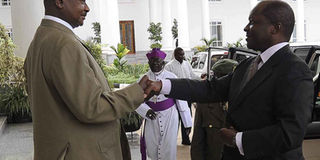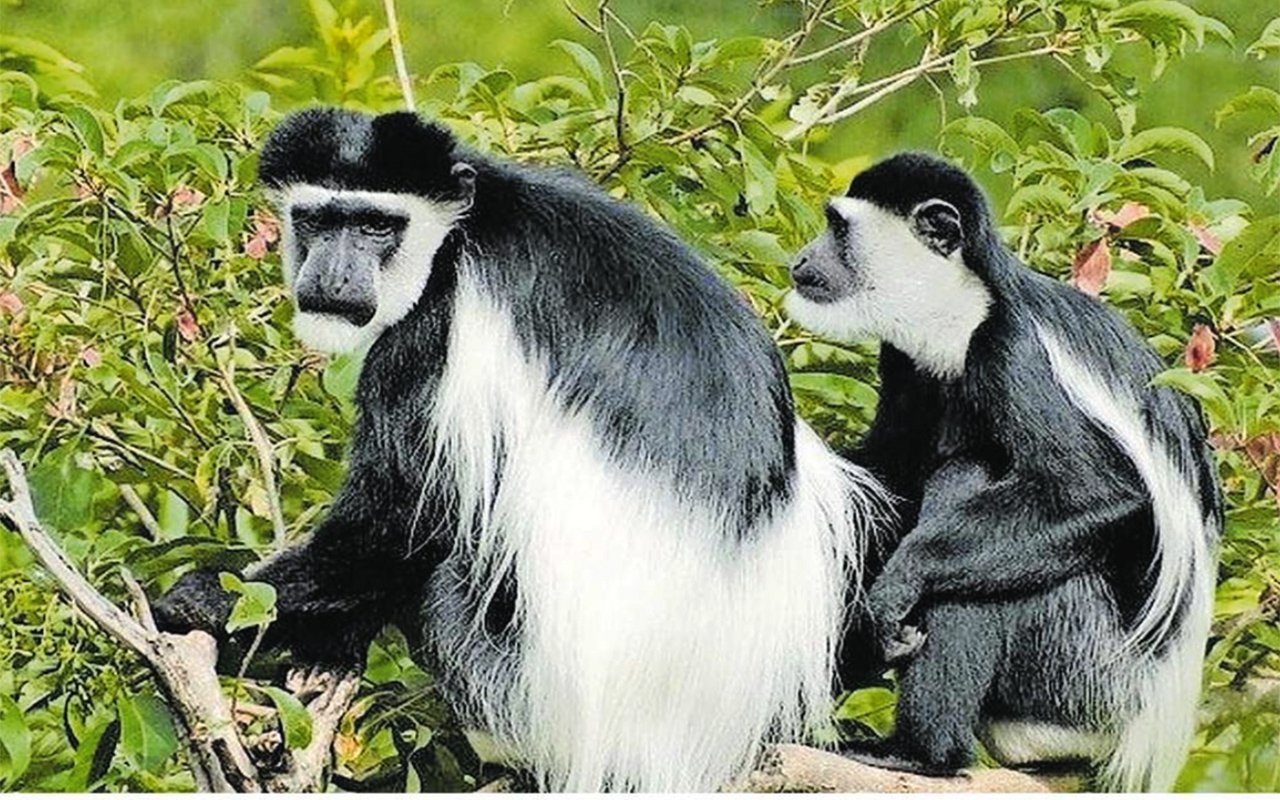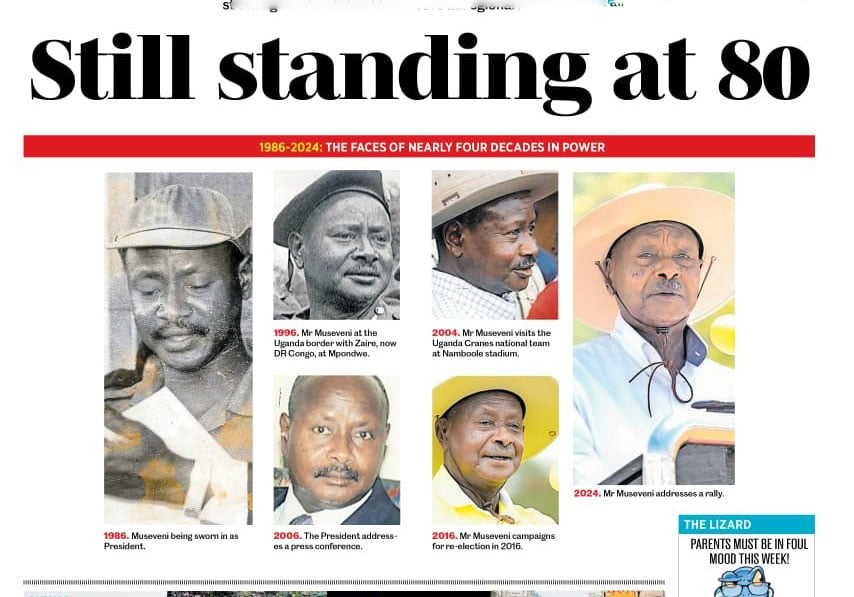Prime
Buganda, the NRM and 2011 elections

FACADE?: Warm handshakes and smiles in the past have not been enough to thaw relations between Buganda and President Museveni’s NRM government.
It is now something of a truism to say that relations between the NRM government and Buganda, broadly speaking, are far from good. Indeed, relations between the Buganda monarchy and President Yoweri Museveni have been on the decline for a number of years now, notwithstanding attempts at keeping up appearances through talks mainly about talks and calculated photo opportunities.
As anyone who is adequately familiar with Buganda’s history knows, for large numbers of Baganda, such is their adoration for, and allegiance to, their kings that anyone who is perceived, correctly or not, to have slighted or behaved incorrectly towards him, becomes an automatic enemy.
And for large numbers of Baganda, such is the awe with which they view their kings that they believe anyone who angers or hurts him will pay for it. It is from this belief that probably originates the saying “kabaka munnyango aligukwatako gulimwokya” (the Kabaka is a ‘munnyango’, you touch him at your peril). Munnyango is the name of a plant which, if it comes into contact with one’s skin, provokes an intense itching sensation.
Slow slide
The deterioration in relations between the former bosom allies, analysts contend, will cost the NRM dearly in the region come the 2011 general elections. It is a view one encounters not only among the regime’s critics and detractors, but also some of its supporters as well as admirers of President Museveni.
Indeed, rumour has it that even within the inner sanctums of the ruling party it is more or less taken for granted now that Buganda has already been lost. Some regime insiders I have spoken to have even intimated that inside “the system” Buganda is now considered to be opposition territory, not least because of the foolish decision to bar the Kabaka from going to Kayunga in 2009, the riots it sparked off across the kingdom, the killing of scores by the police and other security agencies, the closure of CBS and, finally the torching of the Kasubi tombs and subsequent events.
Consequently, it has been claimed, the regime has turned its attention to ingratiating itself with eastern and northern Uganda and trying to polish its not-so-clean image over there, in the hope that whatever support they gather in the process, will plug the hole left by Buganda. Assuming that most of western Uganda remains the captive electorate it has proved to be over the last three elections, that is. However, despite the best efforts of its spin-doctors intent on portraying the ‘northern onslaught’ as successful, indications are, few will bite the bait.
There seems to be strong grounds for believing that Buganda, which in the lead up to past elections has defied all predictions that it would desert the NRM may this time finally switch allegiance to those who seek to unseat Museveni and his cronies. The argument advanced by Museveni’s opponents that people in Buganda are as much in the mood for change as others elsewhere is hardly farfetched.
While all this may be true, I would like to argue that those predicting electoral doom for Museveni and his allies in Buganda ought to be a little more cautious, even as his ratings continue to plummet.
There are several reasons why Museveni and the NRM may, and probably will, defy predictions again and win in Buganda, an outcome his opponents, especially in Mengo and Buganda generally, will live to regret, as he is likely to capitalise on it to continue with what some in the region perceive to be activities calculated to weaken if not destroy Buganda and its monarchy as we currently know them.
One of the reasons why voters have stuck with Museveni in the past has been the impression opposition parties have created of themselves as groups driven by no more than the desire to unseat him and gain access to the spoils of power. To make matters worse, the bickering that has characterised their relations with each other has distracted attention from whatever policy alternatives they may have had to offer, to the insults they have been all too ready to throw at each other, and the occasional punches and kicks their supporters of their different factions have exchanged every now and then. The message their behaviour has conveyed to the public was that they were not yet ready to take power and manage the country.
Hard decisions
And so potential supporters have either stuck with Museveni the devil they know, or simply given up on voting altogether, thus the large numbers of abstentions. The decision by potential supporters of the opposition to abstain opens the way for the NRM to win, as its supporters go all out to elect their party and candidate.
While there has been significant change in the way opposition parties relate to each other generally, thanks to the emergence of the Inter-Party Co-operation, the way those outside the IPC are attacking it and those inside attacking back, is reminiscent of their past history. The quarrels are once again helping the NRM’s cause by distracting the public from scrutinising the government’s misbehaviour to ‘enjoying’ mini-wars among and within opposition parties. This is not the way to encourage those who want meaningful change to vote for them.
Opposition party officials have been and continue to be voluble about the need to uproot the Museveni regime and all the people and abuses associated with it. Few would disagree with the view that the people who asked Ugandans to trust them with the power and authority to manage the country and its resources and people responsibly are now viewed with considerable suspicion almost everywhere. It would therefore appear as if the work of those who seek to replace them is fairly simple and straight forward, as they should be preaching to ready converts.
Remarkably, now the country is faced with officials and members of opposition parties falling over each other to vie for the presidency and only a limited number of parliamentary seats. Consequently, one finds several opposition candidates fighting it out in constituencies such as Kampala Central, Masaka Municipality, Kyaddondo North, Kyaddondo South and others across Buganda, while leaving space for the NRM to field unopposed candidates in several constituencies in rural areas.
Predictable defeat
The easily predictable outcome will be defeat where they are fighting each other, and easy victory for the NRM where there are no opposition candidates. These otherwise smart men and women are also foolish enough not to realise how much they are going to divide their collective votes and open the way for Museveni and his supporters to cruise to victory.
Meanwhile, in order to ensure it dilutes the influence opposition parties have across Buganda, the NRM embarked on applying the oldest trick in the book of electoral politics: gerrymandering. As opposition officials and supporters bicker over the few constituencies they are seeking to wrest from each other, the NRM government busily created new constituencies in areas where the ruling party has support, such as in the would-be break-away chiefdoms of Buruuli and Bugerere, and even others.
Take the example of Mukono South constituency. After the NRM’s Reverend Peter Bakaluba Mukasa was trounced by DP’s Betty Nambooze in a recent by-election, the constituency was carved up. At the next parliamentary elections Nambooze will contest in those parts (Mukono Municipality) where she has most support and therefore where an NRM candidate is unlikely to defeat her, if they do not rig, that is, while the parts that do not support her will constitute a new constituency created for the purposes of ensuring the NRM has an MP in the area.
Significantly, while large opposition strongholds such as Kyaddondo South are being left intact, NRM strongholds were sub-divided to increase the NRM’s chances of retaining a large number of seats in Buganda.
Analysts who argue that the NRM is destined to lose Buganda often operate under a false assumption, namely that there is an identifiable agenda around which Baganda coalesce and form a massive block vote. The race by Baganda opposition candidates to unseat fellow Baganda candidates of other parties is clear demonstration that there is no such thing as a Buganda agenda to which all Baganda politicians, let alone potential voters, subscribe. While the love most of these politicians have for the Kabaka, the Kabakaship and their region or homeland is a potential and often actual unifier, their individual love for position, power, influence, and, for some, money, automatically divides them as it is now clear for all to see.
In their failure to cooperate around a clearly defined Buganda agenda which they should have taken the responsibility to define in the first place, lie the roots of the region’s vulnerability as a cultural and political entity and the problems it is likely to confront in the coming years of the Museveni regime whose agenda for it seems to be clearly defined.
The failure by Baganda political elites in the opposition to forge a common agenda for the kingdom despite professing love for the Kabaka and the kabakaship and commitment to preserving them as part of the region’s overall heritage can be seen in the plethora of political groups led by them: Beti Kamya has her Uganda Federal Alliance; Ken Lukyamuzi leads the Conservative Party; Hussein Kyanjo heads Jeema; Bidandi Ssali leads the People’s Progressive Party; Michael Mabikke heads the Social Democratic Party; Abed Bwanika is at the helm of the People’s Development Party; former Katikkiro Mulwannyamuli is the engine behind Ssuubi.
More Baganda are scattered in several other parties where they occupy key positions. And then there are those heading important pressure groups and others, such as former Katikkiro Daniel Muliika who, even without having identifiable bases, possess fairly loud voices to which the NRM leadership listens carefully.
It is surprising to discover how very little these people speak to each other and the degree of animosity some feel towards others. And yet they all claim commitment to championing Buganda’s interests within a united Uganda. How they hope to unite Baganda or Buganda, let alone Uganda when they cannot even sit down together and examine what it is they are working for or against, remains one of the great mysteries of Uganda’s politics.
Baganda still count among the wealthiest people in the country and command considerable influence within the business community through groups such as the Kwagalana Group and its several variants. Interestingly, like their relatives and clansmen in political groups, Baganda business elites are for the most part committed monarchists, federalists, and also pay lip service to the necessity to preserve Buganda’s cultural and other institutions.
Many would bow or fall over and prostrate before the Kabaka if they encountered him a public function, in a show, and I mean show, of allegiance. However, it is also well-known that many of the most influential among them are securely in the NRM camp, not least because of the vast opportunities for further self enrichment affiliation with the ruling party and its leadership has opened up for them. Others, though, claim to fear possible harassment and destitution were they to be seen to work against the regime. And so again, the NRM wins hands down.
Which establishment?
And where is Mengo in all this? I would say it is everywhere and nowhere. While the Buganda establishment or what newspapers like to label as such, has won itself distinction by way of the vast battles it has waged and sometimes won against the NRM, it can take its fight only so far.
Legal restrictions against participation in partisan politics constrain the space within which it can operate in its own interest, and so that role should ideally be performed by the various actors named above. But as we have seen, they too are constrained by personal and other considerations. For now it seems as if the NRM already has Buganda in the bag. It will take a great deal to change that.
Mr Golooba-Mutebi is a senior research fellow, Makerere Institute of Social Research.




